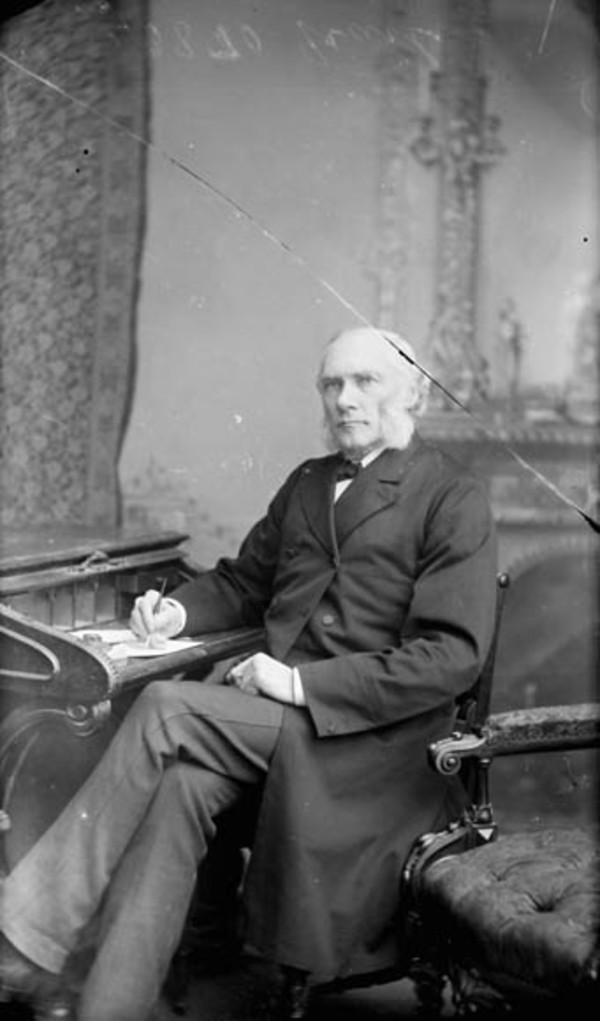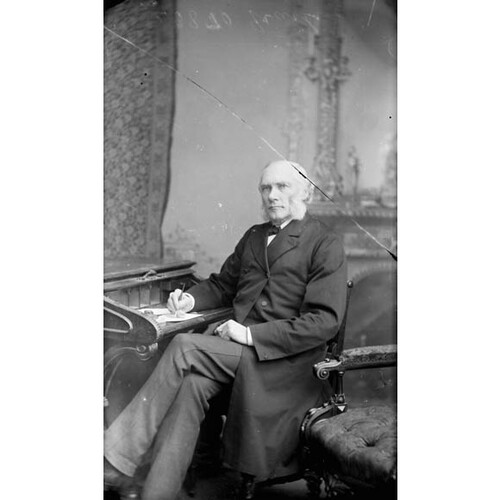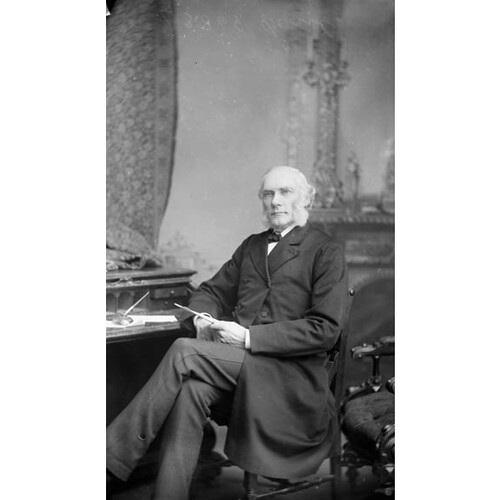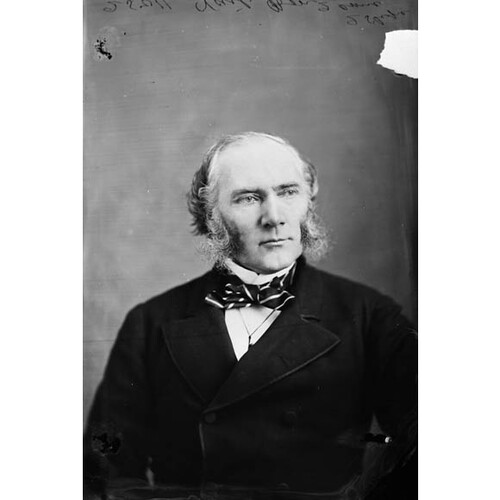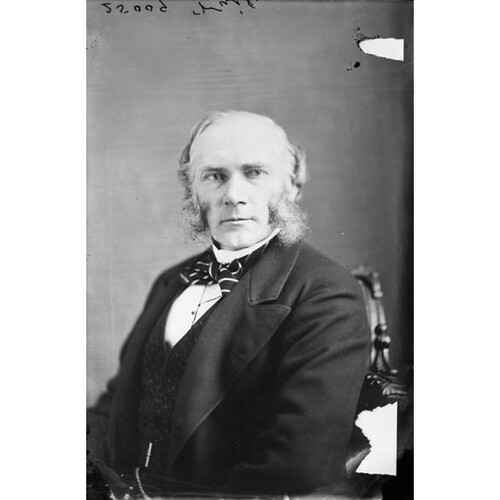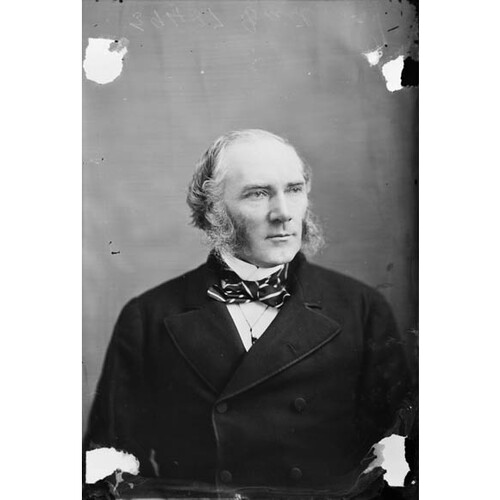VAIL, WILLIAM BERRIAN, businessman, politician, and militia officer; b. 19 Dec. 1823 in Sussex Vale (Sussex Corner), N.B., son of John Cougle Vail, mha for Kings County, and Charlotte Hannah Arnold; brother of Edwin Arnold Vail*; m. 22 May 1850 Charlotte Leslie Jones in Weymouth, N.S., and they had two daughters; d. 10 April 1904 in Dover, England.
William Berrian Vail was born into a proud and prominent New Brunswick loyalist family. In 1846, following schooling in Sussex Vale and Kingston, N.B., he joined his brother John O. in Digby, N.S., where they shared in the mid-century shipping boom and carried on a successful business. Vail also served in the local militia, and on 18 Sept. 1863 he was appointed to command the 2nd Regiment of Digby militia.
Like many Nova Scotians, and particularly those in business, Vail was strongly opposed to the proposals for colonial union put forward at the Charlottetown, Quebec, and London conferences between 1864 and 1866, and with other anti-confederationists he was appalled by the process which saw Nova Scotia included in Canada without a chance to vote on the matter. He therefore stood as an anti-confederation candidate in the provincial election of September 1867 and he won in Digby County.
Despite the overwhelming victory of the anti-confederate forces in the election, the British government refused to repeal confederation. But the Canadian prime minister, Sir John A. Macdonald*, was sensitive to the political climate in Nova Scotia, and he realized that some kind of accommodation had to be reached with the still-reluctant province. A moderate anti-confederationist, Vail had become provincial and financial secretary in Premier William Annand*’s administration and leader of the government in the House of Assembly. He did not, however, play an important part in the negotiations which, in January 1869, produced “better terms” for Nova Scotia, because he did not have good relations with Joseph Howe*, the principal negotiator from the province.
Despite the granting of better terms, many Nova Scotians remained opposed to confederation. Vail had to work hard to keep Annand’s government on an even keel, resisting both those who continued to seek the repeal of confederation and those who sought Nova Scotia’s annexation by the United States, while at the same time attempting to obtain improved financial conditions from Ottawa. In 1873, for example, following further negotiations, the provincial debt allowance was increased, and this move ultimately assisted the government to provide subsidies for the building of railways. Vail himself was particularly influential in finding support for the Eastern Extension and Western Counties lines and in seeing that the latter was based in Digby.
By the summer of 1874 Prime Minister Alexander Mackenzie* had become disenchanted with the performance of William Ross, the first minister of militia and defence in the Liberal government elected that year, and he turned to Alfred Gilpin Jones, a relation of Vail by marriage, as a replacement. Jones was not interested, but he told Mackenzie that Vail had tired of provincial politics and might be persuaded to run for federal office. Mackenzie took up the suggestion, Vail agreed, and on 30 Sept. 1874 he was named minister of militia. He then won election to the House of Commons from Digby.
During Vail’s tenure as minister the Royal Military College of Canada was organized and opened at Kingston, Ont., and Major-General Edward Selby Smyth was appointed the first general officer commanding the Canadian militia. These developments were important in the early history of the Canadian army, but neither had been the minister’s idea. Indeed, apart from supervising the distribution of patronage within the department and overseeing some of the initial staff appointments to RMC, Vail left little mark on the militia, and Mackenzie would later complain that he was “never of any use to me.” Particularly awkward during debate, he rarely spoke in the commons, perhaps because he realized that he was not an effective minister.
In December 1877, despite persistent pleading with the prime minister, Vail was forced to resign his seat because of a conflict of interest [see Jones]. Having lost the by-election which followed, he did not contest the 1878 general election and returned to his business interests. In 1882 he represented the Nova Scotia government in England, where he tried to find investment capital for the Western Counties Railway. Vail ran again for parliament that year and won, only to lose in the 1887 general election. Even as an opposition member, he spoke rarely and briefly, but he maintained his interest in the militia, usually finding something to carp about in the departmental estimates. He also criticized the government’s failure to improve the economy of Nova Scotia and Digby County, especially in terms of providing additional subsidies for shipping and railways. From 1887 to 1896 Vail lived in retirement in Halifax. He then moved to Dover, England, where he resided with his daughter until his death.
NA, MG 26, B; G; MG 29, D61: 8116–18. Digby Weekly Courier (Digby, N.S.), April 1904. Globe, April 1904. Morning Chronicle (Halifax), April 1904. Beck, Politics of N.S., 1: 169–216. Can., House of Commons, Debates, 1874–78, 1883–87. Canadian directory of parl. (Johnson). Canadian men and women of the time (Morgan; 1898). CPG, 1876, 1878, 1883, 1887. R. O. Goss, “Economics and Canadian Atlantic shipping,” Merchant shipping and economic development in Atlantic Canada, ed. L. R. Fischer and E. W. Sager (St John’s, 1982), 87–112. Legislative Assemble of N.S. (Elliott). Desmond Morton, Ministers and generals: politics and the Canadian militia, 1868–1904 (Toronto and Buffalo, N.Y., 1970). W. L. Morton, The critical years: the union of British North America, 1857–1873 (Toronto, 1964). N.S., Adjutant General’s Office, Adjutant general’s report (n.p.), 1866. R. A. Preston, Canada’s RMC: a history of the Royal Military College (Toronto, 1969). K. G. Pryke, Nova Scotia and confederation, 1864–74 (Toronto, 1979).
Cite This Article
Stephen J. Harris, “VAIL, WILLIAM BERRIAN,” in Dictionary of Canadian Biography, vol. 13, University of Toronto/Université Laval, 2003–, accessed December 30, 2025, https://www.biographi.ca/en/bio/vail_william_berrian_13E.html.
The citation above shows the format for footnotes and endnotes according to the Chicago manual of style (16th edition). Information to be used in other citation formats:
| Permalink: | https://www.biographi.ca/en/bio/vail_william_berrian_13E.html |
| Author of Article: | Stephen J. Harris |
| Title of Article: | VAIL, WILLIAM BERRIAN |
| Publication Name: | Dictionary of Canadian Biography, vol. 13 |
| Publisher: | University of Toronto/Université Laval |
| Year of publication: | 1994 |
| Year of revision: | 1994 |
| Access Date: | December 30, 2025 |


